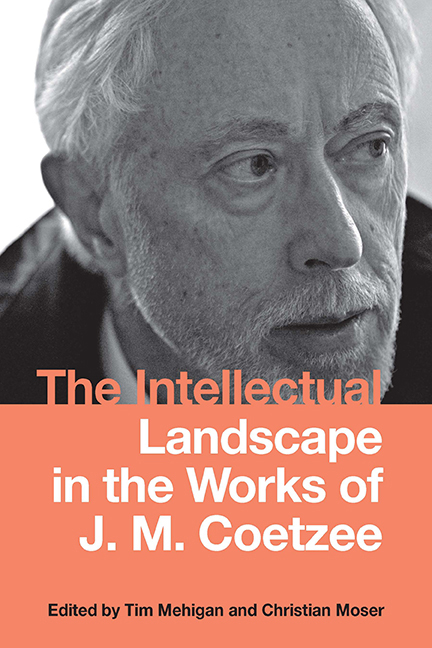Book contents
- Frontmatter
- Contents
- Acknowledgments
- Introduction: Coetzee's Intellectual Landscapes
- Part I Truth and Justification
- Part II Objectivity and Communication
- 6 Faith, Irony, Salt, and Possible Impossibilities: J. M. Coetzee's The Childhood of Jesus in Conversation with Zbigniew Herbert's “From Mythology”
- 7 Coetzee's Ethics of Language(s)
- 8 Force Fields
- 9 The Reading of Don Quixote: Literature's Migration into a New World
- 10 The Lives of Animals: From Rational Language to Speaking (of) Lions
- Part III Convergence of Interpretative Horizons and Moral Solidarity
- Notes on the Contributors
- Index
6 - Faith, Irony, Salt, and Possible Impossibilities: J. M. Coetzee's The Childhood of Jesus in Conversation with Zbigniew Herbert's “From Mythology”
from Part II - Objectivity and Communication
Published online by Cambridge University Press: 03 July 2019
- Frontmatter
- Contents
- Acknowledgments
- Introduction: Coetzee's Intellectual Landscapes
- Part I Truth and Justification
- Part II Objectivity and Communication
- 6 Faith, Irony, Salt, and Possible Impossibilities: J. M. Coetzee's The Childhood of Jesus in Conversation with Zbigniew Herbert's “From Mythology”
- 7 Coetzee's Ethics of Language(s)
- 8 Force Fields
- 9 The Reading of Don Quixote: Literature's Migration into a New World
- 10 The Lives of Animals: From Rational Language to Speaking (of) Lions
- Part III Convergence of Interpretative Horizons and Moral Solidarity
- Notes on the Contributors
- Index
Summary
IN DAVID LODGE's CAMPUS NOVEL Small World (1984), Persse, a young Irish lecturer at Limerick University College, talks about his master's thesis with Felix Skinner, a publisher who offers to publish his book:
“Well, I did my research on Shakespeare and T. S. Eliot,” said Persse…. “But my thesis is … about the influence of T. S. Eliot on Shakespeare.” …
“Well, what I try to show,” said Persse, “is that we can't avoid reading Shakespeare through the lens of T. S. Eliot's poetry. I mean, who can read Hamlet today without thinking of ‘Prufrock’? Who can hear the speeches of Ferdinand in The Tempest without being reminded of ‘The Fire Sermon’ section of The Waste Land?”
The relation between Shakespeare and Eliot that Persse puts forward is not one of traditional influence of the earlier on the later work, but fostered “preposterously”—a term Mieke Bal uses to describe an act of reversal that “puts the chronologically first (pre-) as an aftereffect behind (post-) its later recycling.” Coetzee's fiction is constituted through such “preposterous” relations between literary voices: each voice engages with voices from other texts, which address, challenge, ironize, allegorize each other without any of them posing as a stable origin. Can the experience of reading Robinson Crusoe ever be the same after reading Foe?
The interplay of voices from other literary works and narratives in Coetzee's fiction often prompts allegorical readings. However, his novels frustrate attempts to translate this allegoricity into propositional messages or external frames. The Childhood of Jesus (COJ) is no exception to this: its title sets the reader on a track of discovering analogies with the New Testament narrative of Jesus. But although Biblical motifs permeate the narrative, the novel, surprisingly, unravels in a new world that has cut ties with past traditions.
In the novel's world, people have renounced history, tradition, and cultural memory. The reception center in which the protagonist, Simón, and the five-year-old child, David, arrive after a long journey is called “Novilla.” This name evokes the novel, a new start, as well as an act of negation: as a non-city (no-villa), this center disavows ties with other worlds. Ana, the woman they meet at the reception center, tells Simón: “People here have washed themselves clean of old ties.
- Type
- Chapter
- Information
- The Intellectual Landscape in the Works of J. M. Coetzee , pp. 133 - 157Publisher: Boydell & BrewerPrint publication year: 2018
- 1
- Cited by



